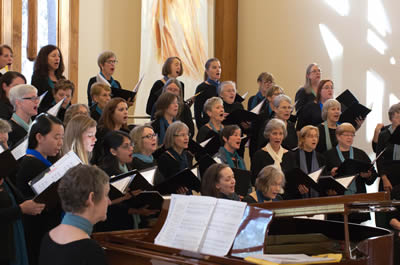The collection of shape note hymns known as Southern Harmony was first published in 1835, so this year is the 175th anniversary. William Walker (1809-1875) of Spartanburg, SC was the compiler of Southern Harmony. Celebrating that anniversary, Charlie W. Steele presented a program of organ works by composers with Carolina connections or with shape-note origins. The location was the sanctuary of Brevard-Davidson River Presbyterian Church, which has a Zimmer two-manual organ built in Denver, NC.
Three selections from Dan Locklair’s Salem Sonata opened the program. Locklair, a native of North Carolina, is Professor and Composer-in-Residence at Wake Forest University and was recently Composer-in-Residence at Brevard Music Center. Samuel Barber’s Wondrous Love: Variations on a Shape-note Tune was then followed by three preludes by Mark Siebert from his Preludes on Campmeeting Songs. The shape-note theme was well established by these selections; now it was time for some works that were revelations about North Carolina organ composers.
Charles G. Vardell, Jr. (1893-1962) had deep connections with Salem College and a variety of Winston-Salem churches. Mr. Steele performed Vardell’s “Skyland,” which was described by the composer as a program piece that drew upon mountain ballads, the Blue Ridge Mountains, and the folk song “Barbara Allen” in a variant that was peculiar to Western North Carolina. To this listener, that variant of “Barbara Allen” reflected the sound of bagpipes more than the conventional Scots form. While Vardell’s work sounds dated (it was written in 1931), it was most interesting.
Vardell’s daughter Margaret Vardell Sandresky (b. 1921) also had Salem College connections. After studying composition with Howard Hanson and Bernard Rogers at Eastman School of Music (and organ with the noted Harold Gleason there), Sandresky eventually returned to Winston-Salem where she taught at Salem College and established the organ program at the North Carolina School of the Arts. Now retired, Ms. Sandresky is a more sophisticated composer than her father. Her Three Pieces for All Saints’ Day was the highlight of the evening, appropriately showcased immediately before intermission.
Beginning the second half of the program was a partita by Franklin D. Ashdown (b. 1942). The work seemed a little trite, but occasionally rose to a higher level. An interesting passage pitted “Amazing Grace” as counterpoint to “Holy Manna.” The fifth-movement Toccata was exciting, but sounded so Louis Vierne-inspired that it verged on plagiarism.
Robert J. Powell (b. 1932) of Greenville, SC is the composer of many works for organ and choirs. Three selections from Early American Hymn-Tune Preludes and a patriotic song for Veteran’s Day were on this program, with the third prelude “The Morning Trumpet” being the most attractive. The final selection was Variations on “Amazing Grace” by Joe Utterback (b. 1944). The seven variations were remarkably clever, including some with the walking bass and rhythms of jazz and others with baroque influence.
Charlie Steele may not be a flashy organist and the church’s Opus 21 Zimmer organ may not produce the intimidating sound of some of the larger organs in our region, but both organ and organist proved entirely adequate in the presentation of a well-conceived and thoughtful program that demonstrated the importance of southern, and particularly Carolinian, hymnody. The evening also introduced us to Margaret Sandresky’s wonderful work.
“Amazing Grace” was a fitting finale. This was a graceful event.











